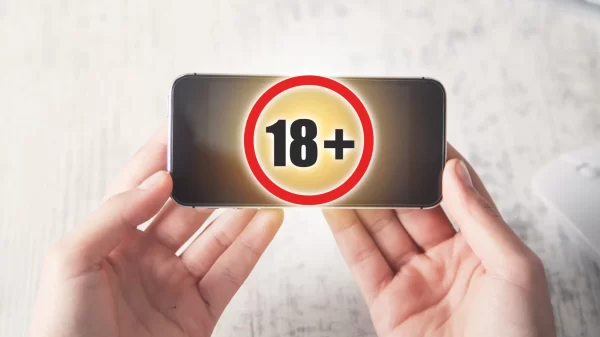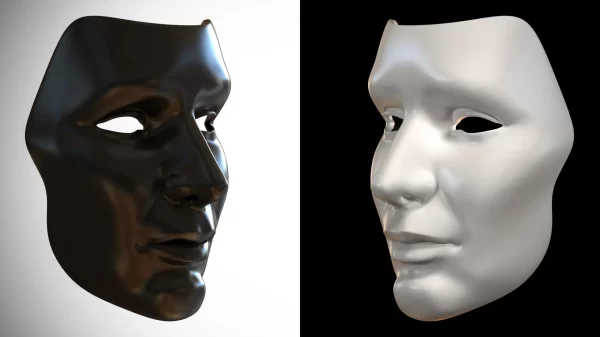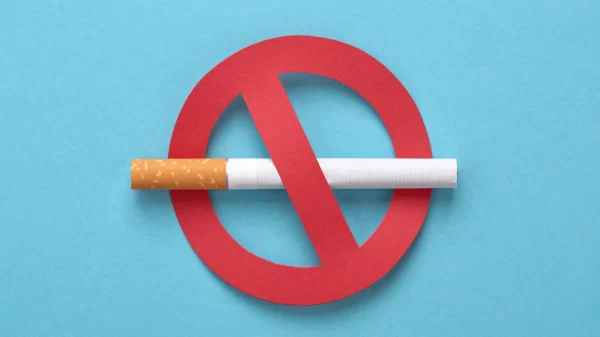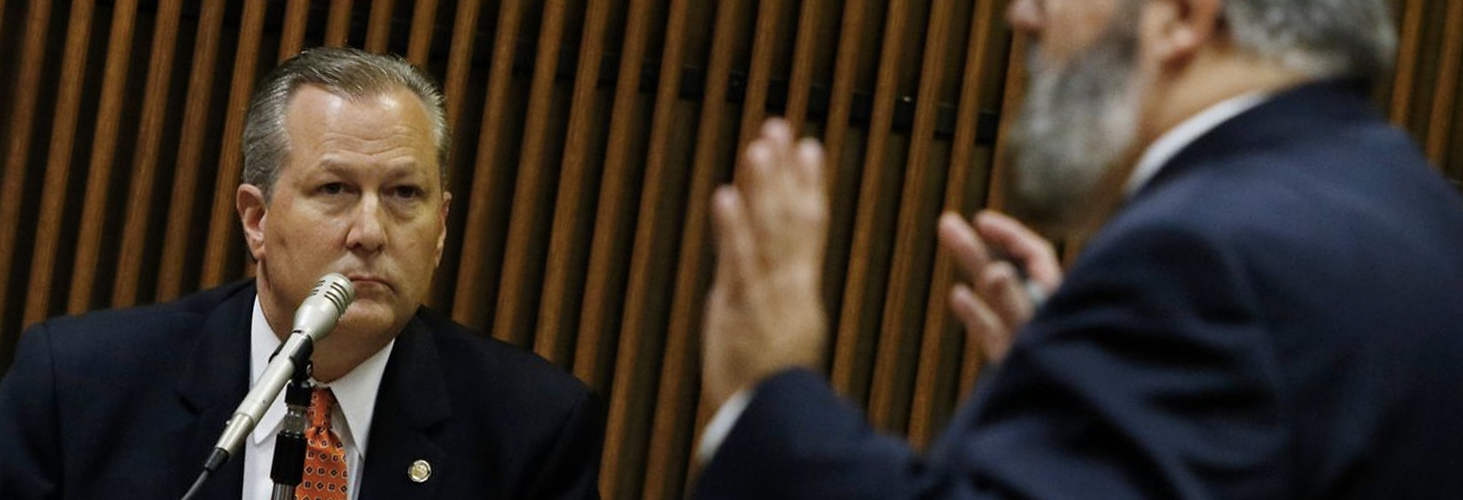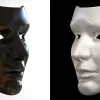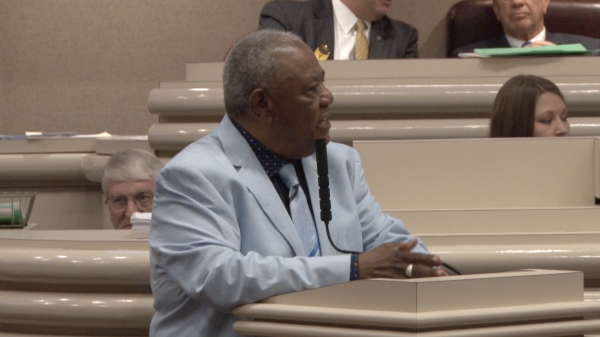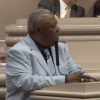By Chip Brownlee
Alabama Political Reporter
Former House Speaker Mike Hubbard – facing four years in a State penitentiary – is another step closer to finding out if he will actually serve that sentence.
But prosecutors from the Alabama Attorney General’s Office showed in a brief filed Monday that they are no more willing to go soft on him now than they were when he was convicted of 12 felony ethics charges last year.
“Hubbard sold his office to benefit himself,” the State prosecutors wrote in their brief, responding to Hubbard’s opening written arguments in his case before the Court of Criminal Appeals.
The State’s charged response – filed Monday night with the Court of Criminal Appeals – comes a little over a month after Hubbard’s team filed their own 118-page opening brief.
Hubbard’s attorneys argued that his conviction should be overturned because the evidence presented at the trial was insufficient and prosecutors from the Alabama Attorney General’s Office used an overly broad interpretation of State ethics laws to get Hubbard convicted by the jury.
SEE MORE: In-depth: Former House Speaker files written brief in appeals case
They said he should be acquitted of the charges. The State obviously disagreed.
“If anything is illegal under Alabama’s Ethics Laws, Hubbard’s conduct is,” prosecutors from the State wrote in their response. “Hubbard’s conduct goes to the very heart of what the Ethics Laws prohibit, and the jury found that his conduct violated the law.”
In their response, the State wrote that there was plenty of evidence, and “Hubbard does not point to any count where the State failed to present sufficient evidence.”
The State spends dozens of pages in the brief rehashing the evidence presented at trial last summer, urging the Court of Appeals to reject Hubbard’s attorneys’ claims of insufficiency and affirm his 12 convictions. They also spent time again defining what a “principal” and a “lobbyist” are under State Ethics laws.
The arguments in both of the written briefs, in many ways, reflect the arguments from Hubbard’s Lee County trial last year, where — after weeks of arguments and testimony — a Lee County jury found Hubbard guilty of 12 felony ethics violations.
A Grand Jury had originally charged him with 23 counts. He was acquitted on 11 counts.
A month later, Lee County Circuit Judge Jacob Walker sentenced Hubbard to four years in a State penitentiary and an additional eight years on supervised probation. He was automatically removed from office in accordance with State law.
Hubbard’s appeal comes at a time when the future of Alabama’s state Ethics Laws remain in question. A reversal from the Court of Criminal Appeals or a subsequent ruling from the Supreme Court could mean a much more lenient interpretation of the laws going forward.
“If Hubbard’s conduct is not prohibited by the Ethics Laws, then the laws are a sham designed to let lawmakers disguise unethical conduct with a veneer of legality,” the State wrote in their brief Monday.
Even without a reversal from the Court of Criminal Appeals, the Ethics Laws have faced an onslaught from prominent attorneys in the state who have been working to undermine them. So far, those efforts have been unsuccessful.
Deputy Attorney General Matt Hart, who leads the Special Prosecutions Division and helped oversee Hubbard’s conviction, has also been the subject of complaint. Hubbard’s attorneys accused him of prosecutorial misconduct before Hubbard’s trial last year, accusing him of inappropriately influencing a Grand Jury through intimidation and leaking documents to the media.
Walker rejected all of those allegations.
Hubbard’s attorneys resurfaced those allegations in their opening appeal brief.
“The evidence allows only one reasonable conclusion: that the grand jury’s decision to indict was likely swayed by that misconduct,” the attorneys wrote. “The case should have been dismissed on this basis.”
The State has maintained throughout the process that Hart did not abuse his authority. But even if he had, the Jury’s guilty verdicts makes their prosecutorial misconduct claims moot, the State wrote.
“When a trial jury finds a defendant guilty beyond a reasonable doubt, that verdict necessarily vindicates the Grand Jury’s finding of probable cause and supersedes any errors in the grand jury proceedings,” they wrote, citing Supreme Court precedent.
Essentially: Hubbard offered no evidence that there was prosecutorial misconduct, and it doesn’t matter at this point, anyway, according to the State.
Like the pre-trial motions alleging prosecutorial misconduct, the Lee County Circuit Court also denied post-trial motions that sought a new trial or acquittal based on allegations of juror misconduct.
SEE MORE: Read the State’s full response
Juror misconduct also made its way into Hubbard’s appeal. The State wrote that the Circuit Court was correct in rejecting the allegations. They also say that Hubbard failed to pursue the proper remedies and didn’t properly brief those claims on appeal.
After Hubbard was convicted, it came to light that a juror had told a court staffer that another juror was talking about the evidence outside of deliberations – a violation of protocol. Walker took testimony from the staff at a post-trial hearing and later dismissed the allegations of juror misconduct.
During the post-trial hearings, Hubbard declined to subpoena the juror. Instead, he wanted an investigation by the Sheriff’s Department, which Walker declined. Even though Hubbard declined to subpoena a juror, his attorneys said the court “failed to investigate” the allegations.
“The circuit court determined that Hubbard was not prejudiced, and the jury issued a split verdict, demonstrating that the jurors weighed the evidence and decided the case based on the law and facts before them,” the state responded. “This Court should not disturb that verdict.”
Elsewhere in the 130-page response to Hubbard’s attorneys, the State also pushed back against claims that it was improper for prosecutors to allow former Ethics Commission Director Jim Sumner to testify as an expert witness.
“Mr. Sumner’s testimony was all the more harmful because in various ways it was a misinterpretation of the Ethics Laws, and a departure from the text of the laws with a substitution of non-statutory standards that the Legislature did not enact,” Hubbard’s attorneys wrote.
Hubbard’s attorneys said direction about the Ethics Law should only come from a judge, but Walker ruled in post-trial motions that Sumner’s testimony about the Ethics Laws and Hubbard’s multi-thousand-dollar consulting contracts was both proper and admissible.
“The circuit court properly determined that Sumner is an expert with special knowledge of Alabama’s Ethics Laws and permitted him to testify in this case involving those laws,” the State wrote, citing Court of Criminal Appeals precedent that has allowed Ethics Commission officials to testify about the State’s Ethics Laws.
The State also noted that Hubbard’s defense team qualified Sumner as an expert witness in pre-trial hearings and were made aware that the State planned to call him as a witness even though the State is not required to notify the defense about their witnesses.
The Court of Criminal Appeals could make a ruling on the case based on the written briefs or they could allow the case to go to oral arguments later this year. They haven’t issued a decision either way.
The Appeals Court could overturn all, some or none of the verdicts from the Lee County Trial, leaving Hubbard’s sentence in flux. The former speaker remains free on appeal bond until the appeals process is complete, which could be months or years depending on if the Alabama Supreme Court takes up his case.
Email Chip Brownlee at [email protected] or follow him on Twitter at @chpbrownlee.












